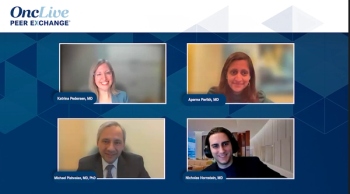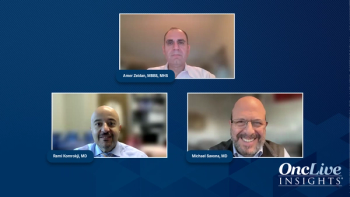
Overview of the 5-Year Follow-Up Analysis From ZUMA-5: A Phase 2 Trial of Axi-Cel in R/R Indolent NHL
Panelists discuss how the 5-year follow-up data from the ZUMA-5 trial demonstrate sustained efficacy and durable remission of axicabtagene ciloleucel in patients with relapsed/refractory (R/R) indolent non-Hodgkin lymphoma (iNHL), potentially signaling a paradigm shift toward considering chimeric antigen receptor (CAR) T-cell therapy as a more prominent early-line treatment option for these challenging lymphoma subtypes.
Episodes in this series

Video content above is prompted by the following:
ZUMA-5 5-Year Follow-Up: Axicabtagene Ciloleucel in R/R iNHL
Key Findings
Long-Term Efficacy Highlights
- Sustained durable responses observed in patients with R/R iNHL
- Demonstrates the potential of CAR T-cell therapy as a transformative treatment approach
- Continued efficacy and manageable long-term safety profile beyond initial clinical trial period
Durability of Response
- Maintained complete response rates at 5 years
- Consistent progression-free survival in heavily pretreated patient population
- Suggests CAR T-cell therapy can provide long-term disease control in challenging iNHL cases
Clinical Implications
Treatment Strategy Considerations
- CAR T-cell therapy emerges as a potentially curative option for patients with multiple prior lines of therapy.
- Particularly promising for patients with limited treatment alternatives
- Supports earlier consideration of CAR T-cell therapy in the treatment algorithm for R/R iNHL
Patient Selection
- Most beneficial for patients with:
- Multiple prior treatment lines
- Chemotherapy-resistant disease
- Good performance status
- No significant comorbidities limiting CAR T-cell therapy eligibility
Practical Takeaways
- Long-term data reinforce the potential of axicabtagene ciloleucel as a meaningful treatment option.
- Encourages more aggressive consideration of CAR T-cell therapy earlier in the treatment paradigm
- Highlights the importance of comprehensive patient evaluation for CAR T-cell therapy candidacy
Recommendations
- Review individual patient characteristics carefully.
- Consider CAR T-cell therapy as a potential salvage or bridge to subsequent therapies.
- Discuss potential benefits and risks with patients, emphasizing long-term response potential.
- Integrate molecular and clinical factors in treatment decision-making.



































